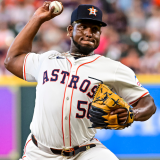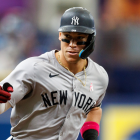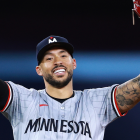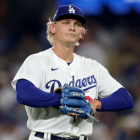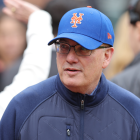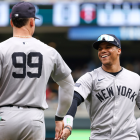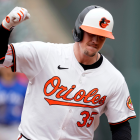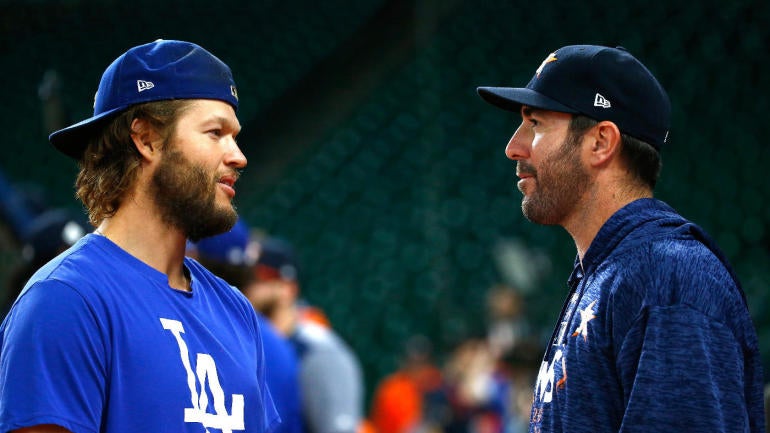
The 2021 World Series is complete and the 2021-22 offseason is already underway. Over 100 players became free agents Wednesday morning, and soon teams will have to make decisions about contract options and qualifying offer. Here's a breakdown of all the important upcoming offseason dates.
The qualifying offer entitles teams to draft pick compensation should they lose a free agent to another team. The QO is a one-year deal set at the average of the top 125 salaries in baseball, and this offseason it is worth $18.4 million. That is down from $18.9 million last offseason, meaning the top salaries came down. That won't sit well with the MLB Players Association.
Teams have until five days after the end of the World Series (Nov. 7) to tender their free agents the QO, and players who receive it then have 10 days to accept or reject (decisions due Nov. 17). Players who accept the QO remain with their team, and players who reject it are attached to draft pick compensation. Simple, right? The process is, but the decisions aren't.
With that in mind, let's run down this offseason's QO candidates. Here are the draft pick compensation rules to get us started.
Compensation rules
Back in the day teams that lost an eligible free agent received a compensation draft pick after the first round. It was nice and easy. The current rules are a bit more complicated. Here are compensation rules for teams that lose a free agent who rejected the QO:
- Player signs contract worth $50 million or less: Draft pick after competitive balance round B (before the third round).
- Player signs contract worth more than $50 million: Draft pick after first round.
- Former team pays luxury tax: Draft pick after fourth round regardless of contract size.
The Dodgers and Padres were the only teams to exceed the $210 million luxury tax threshold this season, so they're the only teams that have to worry about the last bullet point there. Every other team has to hope their qualified free agent signs a contract worth more than $50 million to secure the best possible compensation draft pick.
Now here are the penalties for signing a free agent who rejected the QO:
- Signing team paid luxury tax: Forfeit second and fifth highest draft picks, plus $1 million in international bonus money.
- Signing team received revenue sharing money: Forfeit third highest draft pick.
- All other teams: Forfeit second highest draft pick and $500,000 in international bonus money.
Again, only the Dodgers and Padres paid luxury tax, so they're the only teams that have to worry about the first bullet point. The Brewers, Diamondbacks, Guardians, Marlins, Mariners, Orioles, Pirates, Rays, Reds, Rockies, Royals, Tigers, and Twins received revenue sharing this season, so they're the second bullet point. Every other team is the third bullet point.
In recent years we've seen several players hurt by the QO. Dallas Keuchel and Craig Kimbrel rejected the QO in 2018 and were unable to land new jobs until June 2019, after the draft and after the draft pick compensation went away. Their new teams (Braves and Cubs, respectively) were able to sign them with no penalty. That hasn't happened since but is a concern.
Last year six players received the QO: Kevin Gausman and Marcus Stroman accepted it; DJ LeMahieu and JT Realmuto signed new contracts with their former teams; and Trevor Bauer and George Springer rejected it, giving their former clubs compensation draft picks. Teams do not gain or lose picks for re-signing their own qualified free agent.
Not eligible for QO
Players are eligible for the QO as long as they spent the entire 2021 season with their team and have not received the QO previously. That means a not insignificant number of high profile free agents are not eligible for the QO this offseason. Here are the notables:
- Traded at midseason: Javier Báez, Kris Bryant, Nelson Cruz, Danny Duffy, Eduardo Escobar, Kendall Graveman, Starling Marte, Anthony Rizzo, Max Scherzer, Kyle Schwarber
- Previous QO: Alex Cobb, Kevin Gausman, Zack Greinke, Kenley Jansen, Marcus Stroman
Cruz and Scherzer actually fit into both categories. They were traded at midseason and they previously received the QO as well (Scherzer by the Tigers and Cruz by the Orioles, both in 2014). That doesn't mean anything though. Both are still ineligible for the QO this offseason, so they won't have that hanging over their head.
The Cubs traded Báez, Bryant, and Rizzo for five total prospects at the deadline, including outfielder Pete Crow-Armstrong, the No. 19 pick in the 2020 draft. That's a much better haul than what Chicago would have received had they kept all three guys, given them the QO this offseason, and received a few draft picks.
Locks to get QO
I count six players who are stone cold locks to receive the QO: Carlos Correa, Freddie Freeman, Robbie Ray, Corey Seager, Marcus Semien, and Trevor Story. Expect all six to reject the QO in search of a larger payday (all six could sign a nine-figure contract this offseason). Accepting the $18.4 million QO won't be a serious consideration.
As part of their offseason frugality, the Athletics did not tender Semien (nor Liam Hendriks) the QO last winter, which is Toronto's gain. The Blue Jays signed Semien to a one-year deal worth less than the QO ($18 million), received an MVP caliber season, and now can recoup a draft pick should he sign elsewhere. That is some nifty work by the Blue Jays.
If any of these players accept the QO, their teams would welcome them back with open arms. It must be noted players who accept the QO can not be traded until June 15 without their consent. So if, say, Story accepted the QO, the Rockies wouldn't be able to turn around and trade him immediately without his approval. They'd have to wait until next summer.
Likely to receive QO
I would stop short of calling these players locks to receive the QO, though I think it's more likely than not they receive it: Michael Conforto, Jon Gray, Clayton Kershaw, Carlos Rodón, Eduardo Rodriguez, Noah Syndergaard, Chris Taylor, and Justin Verlander.
Kershaw, Syndergaard, and Verlander were out much or all of the season with elbow problems. Verlander has not pitched since Opening Day 2020 and he turns 39 in February, but the Astros know him better than anyone. If they feel good about his health, they'll make him the QO. If they don't make the QO, it's a red flag. Same goes for Kershaw and Syndergaard.
Conforto missed time with a hamstring problem at midseason and had a down year overall. Rodón was outstanding up until his shoulder began barking down the stretch. He has a long injury history, but the fact he threw 99 mph in the ALDS is a good sign. The Rockies didn't trade Gray at the deadline and are trying to re-sign him. He may agree to an extension before the QO deadline.
Rodriguez had an unusual season. The 4.47 ERA is unsightly, though all the underlying numbers (3.32 FIP, 3.55 xERA, 4.18 DRA) suggest he pitched much better than that number would lead you to believe. Taylor struggled in the second half and he turns 32 next year, though his versatility is valuable. The question is whether the Dodgers are comfortable rolling the dice with $18.4 million.
We're a little in dark with Kershaw's and Verlander's (and Rodón's and Syndergaard's) health. Like I said though, if they get a QO, it means their team feels good about their health. If they don't, it's a red flag. That means something's up. Based on what we know, I think all eight players get a QO. Their teams would not be upset taking them on a one-year, $18.4 million deal if they accept.
Opt-out clauses
Three 2021 All-Stars can opt out of their contracts and become free agents this offseason, and if they do opt out, they will become QO candidates. The three players:
- Nolan Arenado, Rockies: Six years, $164 million remaining on contract.
- Nick Castellanos, Reds: Two years, $34 million remaining on contract.
- JD Martinez, Red Sox: One year, $19.375 million remaining on contract.
Arenado says he's not opting out of his contract, but even if he did, he wouldn't walk away from $164 million only to turn around and accept the one-year, $18.4 million QO. Of course the Cardinals would make him the QO. Same deal with the Reds and Castellanos, who will reportedly opt out of his contract (but hasn't officially yet), and Red Sox and Martinez. If these players opt out, they're getting a QO, no questions asked.
It should be noted AJ Pollock fell just short of the plate appearances threshold necessary to trigger an opt-out clause this offseason. He's been very good the last two years and would have been a QO candidate had he used the opt out, and walked away from the one year and $15 million guaranteed remaining on his contract. Instead, Pollock remains with the Dodgers.
On the fence
There are five players I could see going either way with the QO. Two of them play for the team that finished with the best record in baseball during the regular season: Brandon Belt, Anthony DeSclafani, Raisel Iglesias, Yusei Kikuchi, and Steven Matz.
The Giants locked up Brandon Crawford to a sensible two-year, $32 million extension a few weeks ago and it feels like a similar deal is coming for Belt. He has had injury problems over the years and he missed the NLDS with a broken thumb, though it was a fluke injury on a bunt attempt. I expect him to sign an extension, but if Belt hits the market, I think the Giants make the QO.
Issues with the Dodgers aside, DeSclafani pitched very well for the Giants this year, throwing 167 1/3 innings with a 3.17 ERA. San Francisco has a lot of money coming off the books (they're shedding Gausman's, Johnny Cueto's, and Buster Posey's salaries) and can afford to bring DeSclafani back on a high-priced one-year deal. I think he gets the QO, and may accept it.
Matz had arguably the best season of his career in 2021, throwing 150 2/3 innings with a 3.82 ERA in a division with three other 90-win teams. The Blue Jays are get the most out of their pitchers (like Robbie Ray), though that success doesn't always stick after the player leaves town (like JA Happ). Still, I think Matz is young enough (30) and good enough to get the QO and decline it.
Iglesias will be the best QO-eligible reliever this offseason (Jansen and Kimbrel, if his club option is declined, have received the QO previously) and teams have been stingy with QOs for relievers over the years. Only seven true relievers have received the QO since it was introduced in 2012: Jansen, Kimbrel, Wade Davis, Greg Holland, David Robertson, Will Smith, and Rafael Soriano.
Every reliever except Smith declined the QO. Smith signed his three-year contract with the Braves before the deadline to accept or reject, and he said he would have accepted the QO had Atlanta not made that offer. Kimbrel and Smith are the only relievers to get the QO since 2017. Kimbrel had to wait to midseason to sign and Smith signed quickly because he wanted to avoid the same fate.
I'm stumped with Iglesias. I could see this going either way. The Angels didn't trade him at the deadline and I don't think they would have kept him if they weren't willing to tender the QO and take the draft pick. It wouldn't surprise me to see Anaheim sign Iglesias to an extension and render the QO moot. My guess right now -- and I emphasize this is just a guess -- is Iglesias gets a QO.
Kikuchi's QO case was more interesting a few weeks ago, when he was selected for the All-Star Game. He then pitched so poorly down the stretch that he had to be yanked from the rotation. Kikuchi's contract is complicated. He has already declined his one-year player option worth $13 million. Now the Mariners hold a four-year, $66 million club option. They will obviously decline that.
What does it mean that Kikuchi declined the player option though? Does walking away from $13 million mean he'd also walk away from $18.4 million? Is it even worth the risk to the Mariners to find out? The reward is likely only a draft pick after the third round, remember. I assumed Kikuchi would pick up the player option and render this all moot, though that didn't happen. Hmmm.
Mark Canha, Avisail García, Corey Kluber, and Alex Wood are among the players who could have played their way into QO status this year, but didn't. I would be surprised to see them get a QO. Like Crawford, Charlie Morton recently signed an extension that takes him off the market. So did Lance Lynn, though he previously received a QO and would have been ineligible for one this year.


















